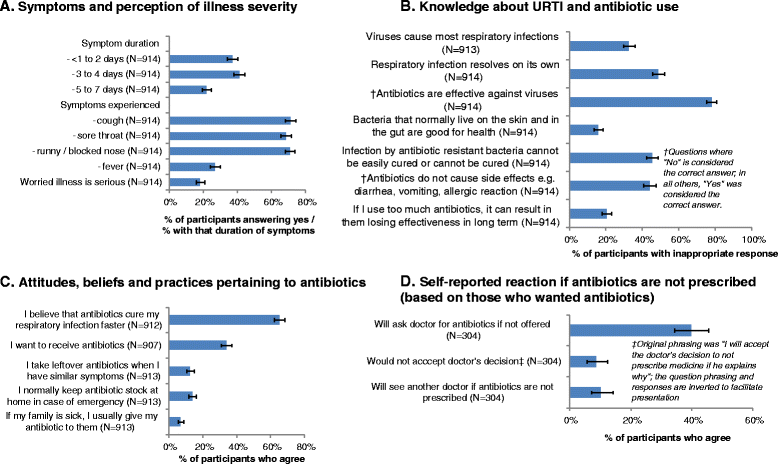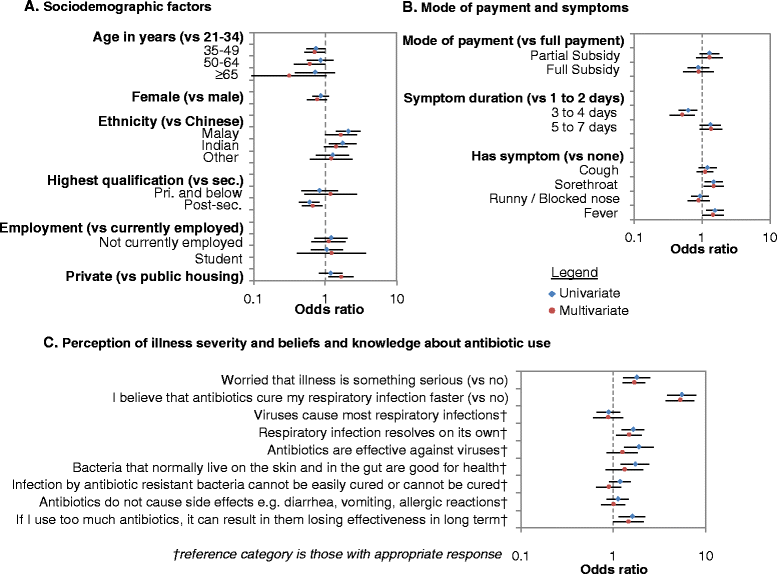Knowledge, attitudes and practices towards antibiotic use in upper respiratory tract infections among patients seeking primary health care in Singapore
- PMID: 27809770
- PMCID: PMC5094024
- DOI: 10.1186/s12875-016-0547-3
Knowledge, attitudes and practices towards antibiotic use in upper respiratory tract infections among patients seeking primary health care in Singapore
Abstract
Background: Patients' expectations can influence antibiotic prescription by primary healthcare physicians. We assessed knowledge, attitude and practices towards antibiotic use for upper respiratory tract infections (URTIs), and whether knowledge is associated with increased expectations for antibiotics among patients visiting primary healthcare services in Singapore.
Methods: Data was collected through a cross-sectional interviewer-assisted survey of patients aged ≥21 years waiting to see primary healthcare practitioners for one or more symptoms suggestive of URTI (cough, sore throat, runny nose or blocked nose) for 7 days or less, covering the demographics, presenting symptoms, knowledge, attitudes, beliefs and practices of URTI and associated antibiotic use. Univariate and multivariate logistic regression was used to assess independent factors associated with patients' expectations for antibiotics.
Results: Nine hundred fourteen out of 987 eligible patients consulting 35 doctors were recruited from 24 private sector primary care clinics in Singapore. A third (307/907) expected antibiotics, of which a substantial proportion would ask the doctor for antibiotics (121/304, 40 %) and/or see another doctor (31/304, 10 %) if antibiotics were not prescribed. The majority agreed "antibiotics are effective against viruses" (715/914, 78 %) and that "antibiotics cure URTI faster" (594/912, 65 %). Inappropriate antibiotic practices include "keeping antibiotics stock at home" (125/913, 12 %), "taking leftover antibiotics" (114/913, 14 %) and giving antibiotics to family members (62/913, 7 %). On multivariate regression, the following factors were independently associated with wanting antibiotics (odds ratio; 95 % confidence interval): Malay ethnicity (1.67; 1.00-2.79), living in private housing (1.69; 1.13-2.51), presence of sore throat (1.50; 1.07-2.10) or fever (1.46; 1.01-2.12), perception that illness is serious (1.70; 1.27-2.27), belief that antibiotics cure URTI faster (5.35; 3.76-7.62) and not knowing URTI resolves on its own (2.18; 1.08-2.06), while post-secondary education (0.67; 0.48-0.94) was inversely associated. Those with lower educational levels were significantly more likely to have multiple misconceptions about antibiotics.
Conclusion: Majority of patients seeking primary health care in Singapore are misinformed about the role of antibiotics in URTI. Agreeing with the statement that antibiotics cure URTI faster was most strongly associated with wanting antibiotics. Those with higher educational levels were less likely to want antibiotics, while those with lower educational levels more likely to have incorrect knowledge.
Keywords: Antibiotic use; Educational level; Primary healthcare; Singapore; Upper Respiratory Tract Infections (URTIs).
Figures


References
-
- World Health Organization . Antimicrobial resistance: global report on surveillance. France: World Health Organization; 2014.
-
- Hsu LY, Kwa AL, Lye DC, Chlebicki MP, Tan TY, Ling ML, Wong SY, Goh LG. Reducing antimicrobial resistance through appropriate antibiotic usage in Singapore. Singapore Med J. 2008;49(10):749–755. - PubMed
-
- Pada S, Lye D, Krishnan P, Chan J, Chan S, Cham G, Ang B, Leo Y. Prevalence and predictors of methicillin-resistant Staphylococcus aureus (MRSA) and extended-spectrum beta-lactamase (ESBL) Gram-negative bacteria at hospital presentation in Singapore. Int J Infect Dis. 2008;12:e449–e450. doi: 10.1016/j.ijid.2008.05.1190. - DOI
MeSH terms
Substances
LinkOut - more resources
Full Text Sources
Other Literature Sources
Medical

